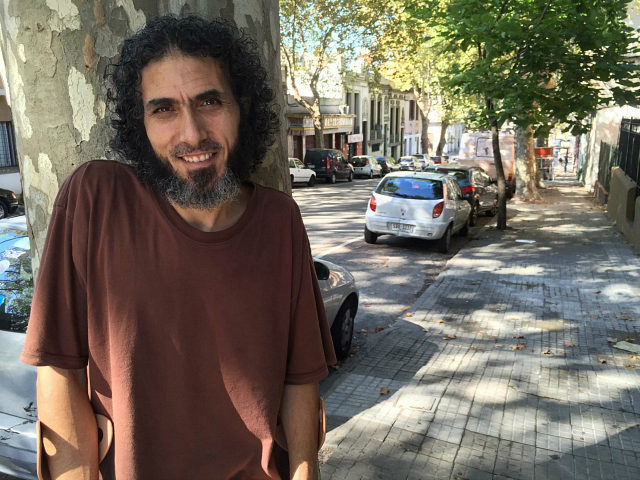Jihad Ahmad Diyab — former detainee at the U.S. Guantánamo Bay detention center and, until recently, Latin American fugitive — may be planning a “hunger strike,” demanding the small nation of Uruguay pay to reunite him with his family in the Middle East.
Diyab, of Syrian and Argentine lineage, has repeatedly been referred to as the most “combative” of the six prisoners the Obama administration freed to Uruguay in 2014 and has said in subsequent interviews that, while he did not have jihadist ties when detained, “I like Al Qaeda now.”
The Russian propaganda news site Sputnik reported earlier this week that “a source close to the prisoner” says Diyab will wage a hunger strike until he can reunite with family in Turkey, Syria, or anywhere in the Middle East. On Thursday, the Washington Post quoted his government liaison, Christian Mirza, as confirming that Diyab was planning the strike. The Associated Press stated that Mirza had only said Diyab “has this idea” but had not confirmed that the hunger strike is ongoing.
Uruguayan sources report otherwise. National network Teledoce reported on August 31 that he was on something he was calling a “hunger strike,” but a source told the network he “ate some grains and drank juice to stay standing.” On Thursday, the network quoted multiple sources as stating that Diyab was eating, though not healthy.
“At this moment, he told us he is not engaged in a hunger strike,” State Health Services Administration head Susana Muñiz told Teledoce. “48 hours ago, when we saw him, he was not undergoing a hunger strike,” she said, adding that “we must be aware that a hunger strike is a possibility that may occur.”
Diyab has been vocal about his distaste for Uruguay. He has refused to learn Spanish or find work, citing numerous health problems. He has repeatedly demanded that Montevideo either bring his family from Syria (now Turkey, as they have fled the civil war) to Uruguay or pay for him to move to the Middle East. He still lives in government-subsidized housing, where Uruguay ensures he is fed and clothed.
In July, shortly before the end of Ramadan, Diyab disappeared, alarming officials in Brazil preparing to organize the 2016 Rio de Janeiro Olympic Games. Diyab resurfaced in late July in Venezuela, demanding the government in Caracas allow him to travel to the Middle East. Venezuela promptly deported him back to Uruguay. While Venezuela’s socialist government is known to have ties to jihadist groups, it is a close ally of Shiite Iran and aids Hezbollah; Diyab is a Sunni Muslim.
During his stay in Venezuela, Diyab allegedly went on a brief hunger strike, demanding to be sent somewhere in the Middle East. While his refugee status allows him to leave Uruguay, other countries must provide him an entry visa for him to leave, which no other country has done so far.
Back in Uruguay, Mirza says the only thing Diyab wants is to leave Uruguay. “He has the same intentions he has declared before… to go to another country and find his family, probably an Arab country,” Mirza told reporters. Diyab had also previously mentioned Turkey as a possibility, in addition to the Arab states.
“It is difficult for him to leave,” Foreign Affairs Minister Rodolfo Nin Novoa told Teledoce. “We have made some moves, tried to help in that sense, but we have not been able to.” He adds that Diyab “has an apartment that the State has provided, with the necessary comforts for him to live with his family, restart his life and, above all, try to defend his anonymity, his intimacy, to leave the eyes of the press.”

COMMENTS
Please let us know if you're having issues with commenting.